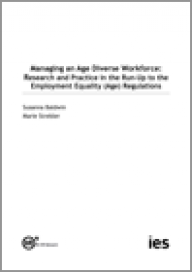Publications
 We author and publish a range of resources to keep you up to date with the latest developments in employment, labour market and human resource policy and practice.
We author and publish a range of resources to keep you up to date with the latest developments in employment, labour market and human resource policy and practice.
All our pdf publications are free to access.
-
📄
Impact of the Working Time Directive on Collective Bargaining in the Road Transport Sector
Broughton A | Nov 2007 | European Industrial Relations ObservatoryThis report explores the impact of the Working Time Directive on collective bargaining in the road transport sector. It first gives an overview of the road transport sector across the European Union, looking at its employment structure and collective bargaining actors, processes and issues. It then examines implementation of the directive in different countries and its impact on key areas such as working time, rest breaks and night work, as well as those cases where derogations from the directive are permitted.
-

Evaluation of Year 2 of the Skills Coaching Trials and Skills Passports
Page R, Casebourne J, Mason D, Tuohy S | Nov 2007 | Learning and Skills CouncilIn partnership with the Centre for Social and Economic Inclusion, IES evaluated Skills Coaching, a careers and coaching service for out of work adults. The evaluation involved: case-studies in nine of the areas running Skills Coaching trials; a review of literature on employability and employment and skills policy; an analysis of the pilots’ management information; and an assessment of the cost of delivering the service.
-

Paying for Performance
New trends in performance-related pay
Suff P, Reilly P, Cox A | Nov 2007 | Institute for Employment StudiesThis paper examines how performance-related pay (PRP) has evolved in recent years. It uses real-life case studies to demonstrate how new techniques, closely linked to the organisation's unique characteristics and needs, can successfully act as a lever to improve individual performance and organisational effectiveness.
-

Managing an Age Diverse Workforce
Research and Practice in the Run-Up to the Employment Equality (Age) Regulations
Baldwin S, Strebler M | Nov 2007 | Institute for Employment StudiesThis report reviews and summarises the employment literature on age discrimination and diversity that existed at the time the Employment Equality (Age) Regulations came into force on 1 October 2006. This is substantiated by IES research findings on age diversity and discussions with company representatives at an IES HR Network Event in the lead-up to October 2006.
-
📄
Employee Absence and Attendance
Hayday S | Nov 2007 | Institute for Employment StudiesThis opinion paper explores the causes of absence, how to measure and monitor absence, and identifies successful absence management techniques. It advocates policies that not only emphasise preventing 'illegitimate' absence, but also give sufficient priority to those who are 'legitimately' absent and aid their return to work.
-
📄
Employee Engagement
Robinson D | Nov 2007 | Institute for Employment StudiesThis opinion paper explores how IES's research has defined engagement, created an engagement measure and provided an engagement diagnostic tool. It identifies the factors that drive engagement and provides general lessons about how to manage employee engagement in your organisation.
-
📄
Stress and Psychosocial Trauma
Lucy D | Nov 2007 | Institute for Employment StudiesThis opinion paper explores the causes of stress, what employers can do to tackle stress, and effective rehabilitation practices.
-
📄
Work-Life Balance
Gifford J | Nov 2007 | Institute for Employment StudiesThis opinion paper draws on IES research to explore how employers manage work-life initiatives.
-
📄
Management and Leadership
Tamkin P | Nov 2007 | Institute for Employment StudiesUK managers have been accused of being under-skilled and underperforming, paralysing organisations through their incompetence. This opinion paper argues that if there is a problem with managers, it might be sensible for organisations to look long and hard at themselves first.
-

Building on Young Apprenticeships
Equal Opportunities
Newton B, Miller L, Page R, Tuohy S | Oct 2007 | Institute for Employment StudiesThe Department for Children, Schools and Families commissioned this report to support the implementation of the recommendations made within the earlier research, 'Young Apprenticeships: Equal Opportunities'. This report: illustrates how to produce careers and training information to promote Young Apprenticeships (YA) to atypical entrants in three strongly gender-segregated sectors; demonstrates how to encourage wider choices and provide practical information, advice and guidance (IAG) through the provision of taster sessions during YA recruitment; and identifies examples of good equalities practice within YA delivery through progress-update visits to the five original case study areas.
